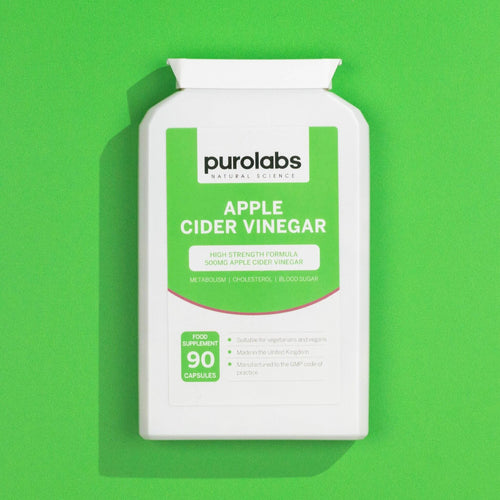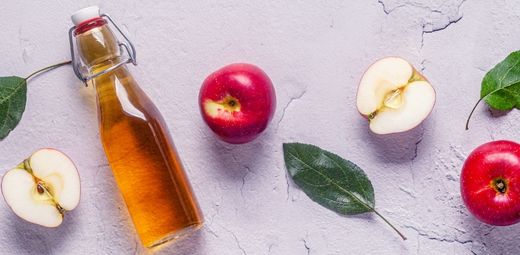Apple cider vinegar, or ACV for short, is a type of vinegar made from crushing and fermenting apples.
The juice of the apples is then squeezed out to create a liquid which is great for adding to dressings, beverages, salads, and anything requiring a tart kick. The health benefits that ACV is well known for deriving from its key ingredient; acetic acid1.
ACV is considered a probiotic food but isn’t a probiotic. Acetic acid is a by-product of the fermentation process that the apples undergo, and acetic acid is the superstar ingredient. Apple cider vinegar also contains lactic, citric, and malic acids which all contribute to its distinctly tart (and strangely addictive) taste2.
Lactic acid is known for its skin-promoting benefits3. Holistic therapies also promote putting ACV topically on the skin as a skin brightening and acne-fighting toner, however, proceed with caution as ACV is an acid, therefore diluting the solution in water before applying it to the skin.
A lot of the evidence for the therapeutic benefits of apple cider vinegar is anecdotal, but there is a lot of it!
I recommend ACV to clients in the clinic to help with various health complaints, all of which I’ll discuss below. I have seen transformative results and if you suffer with gut or skin issues, this may be just what you’re looking for! If I’ve piqued your intrigue, keep reading…
Dosage & Administration
ACV can be taken as a dressing with food or as a diluted drink whenever you like. For gut health benefits, I recommend taking it, diluted in a little water as a shot to take just before large meals to help with digestion.
A simple dressing, which is a personal favourite of mine is:
- 1 tbsp olive oil
- 1 tbsp ACV
- Pinch of salt & pepper
- Juice of ¼ a lemon
Whisk all the ingredients together and pour them on top of your favourite salad.
ACV is a little like marmite…you love it, or you hate it. A great way to get all the health benefits of this drink without having to neck it and pray for the taste to go away is to take it apple cider vinegar tablets. You simply take 1-3 capsules daily with a little water.
If this is your first ACV experience, do start with 1 per day for the first three days and build up to three capsules daily to allow your gut a little time to adjust.

Apple Cider Vinegar
Acid Reflux
The first of many gut health benefits that ACV can help with is acid reflux.
At first, this appears entirely counterintuitive as drinking ‘acid’ to help with acid reflux doesn’t seem to make sense. However, studies point to a significant correlation between low stomach acid and acid reflux4.
The environment within our stomach needs to be highly acidic (pH2) for us to break down our food (most notably, protein). If we don’t have enough stomach acid to do so, the food we ingest sits in our stomach and ferments, causing excess gas which travels up the oesophagus and causes acid reflux symptoms.
This is also why prescribed antacids for acid reflux and heartburn can be problematic. Antacids reduce stomach acid, which may further exacerbate the symptoms of acid reflux. It is important to note, however, that if you are taking antacids consult with your practitioner before considering coming off them.
Bloating & Indigestion
Many believe that the acetic acid in ACV helps with protein digestion and that taking this before a protein-rich meal can help with indigestion and bloating5.
Temporary bloating is a natural by-product of the digestive process6, however excessive bloating is usually down to our digestive capabilities and the food we’re consuming.
There are a few common causes of bloating7:
- Eating a large meal close to bedtime
- Swallowing a lot of air whilst eating
- Not chewing your food thoroughly
- Lack of fibre in the diet
- IBS
- Imbalanced microbiota
- Issues with prokinetic function (the muscles in our GI tract not moving foods along efficiently
ACV helps with digestion and functionality of the gut, therefore can really be a fantastic acid to help counteract chronic bloating.
Anti-Bacterial & Anti-Fungal
Studies have shown that ACV has promising anti-bacterial and antifungal properties. Candida, which naturally resides in our gut and skin, is an opportunistic fungus. In normal concentrations, it lives symbiotically in our gut and on our skin. However, if our microbiome is compromised, then fungi like candida can over-proliferate and become pathogenic8.
I see this strain of fungal organisms elevated in many of my acne clients and simply combating the overgrowth can help to reduce inflammatory skin conditions and improve gut health. If you suffer with acne, do consider taking ACV alongside a dietary candida protocol.
Constipation
As mentioned, ACV helps the stomach to break down food which then allows it to pass through the digestive tract more efficiently. This in turn helps to reduce constipation, as food is not ‘stuck’ in one part of the digestive tract for longer than it should be, fermenting and further promoting constipation.
Another consideration, along with taking ACV, is to ensure that your diet is fibre rich and that you are consuming 1.5 litres of water minimum daily. It sounds basic, but many times constipation can be relieved by consistently implementing a couple of dietary changes.
Anti-Inflammatory
Recent studies are beginning to unearth interesting links between ACV and lipid regulation benefits. One 8-week study on a group of diabetics showed that those who took 15ml of ACV daily saw a reduction in cholesterol and triglycerides levels.
The study wasn’t particularly large or lengthy however the results are promising and worth noting for those who suffer from conditions related to insulin resistance and cardiovascular health9.
Word of Warning
Taking apple cider vinegar supplements will not affect teeth health, however, if you are taking ACV as a drink, then ensure that you drink through a straw as regular direct contact with ACV may increase teeth sensitivity and enamel erosion. It is an ‘acid’ after all so be mindful when taking it daily.
ACV does help with many digestive complaints, however, if your symptoms are particularly problematic, long term or impact daily quality of life, do reach out to a qualified health practitioner to get to the root cause.
ACV is a fantastic supplemental addition to your diet however if your gut-related health issue is particularly detrimental then a targeted health plan may be more beneficial.

 Beauty
Beauty
 Bone Health
Bone Health
 Brain Health
Brain Health
 Energy
Energy
 Eye Health
Eye Health
 Gut Health
Gut Health
 Hair
Hair
 Hormonal Health
Hormonal Health
 Heart Health
Heart Health
 Immunity
Immunity
 Joints
Joints
 Menopause
Menopause
 Pregnancy
Pregnancy
 Kids
Kids
 Sleep
Sleep
 Stress & Mood
Stress & Mood




















